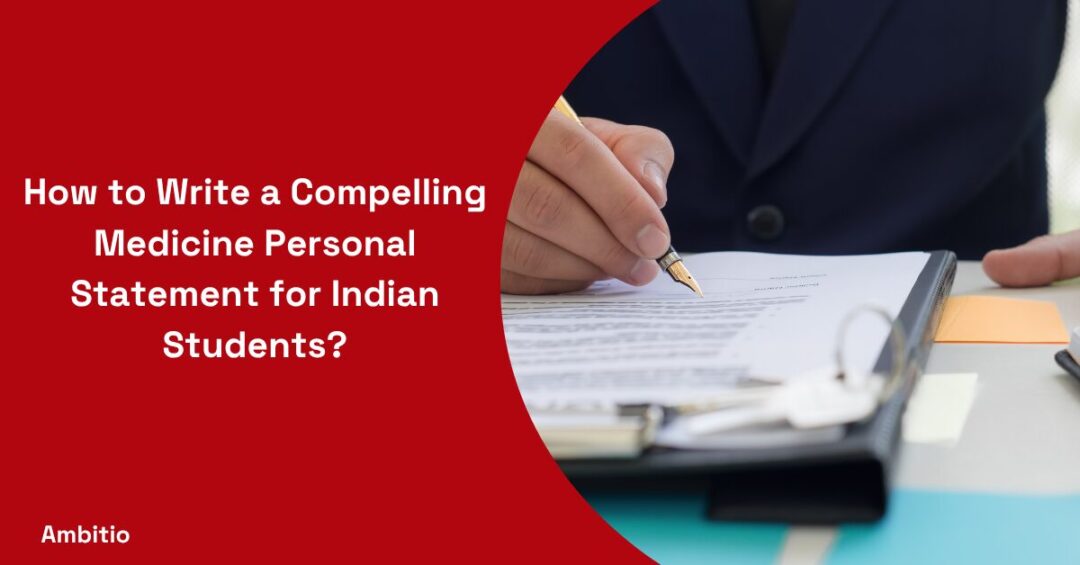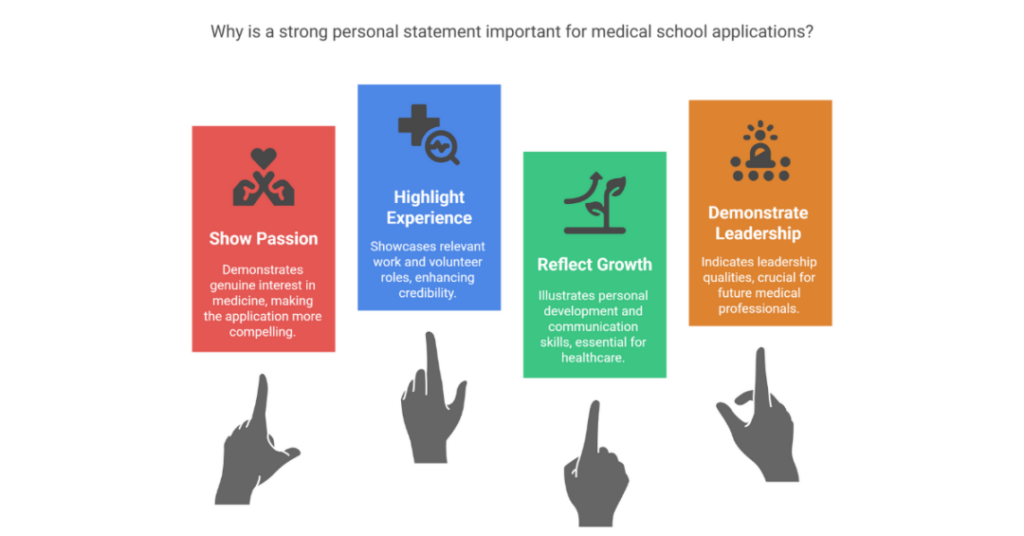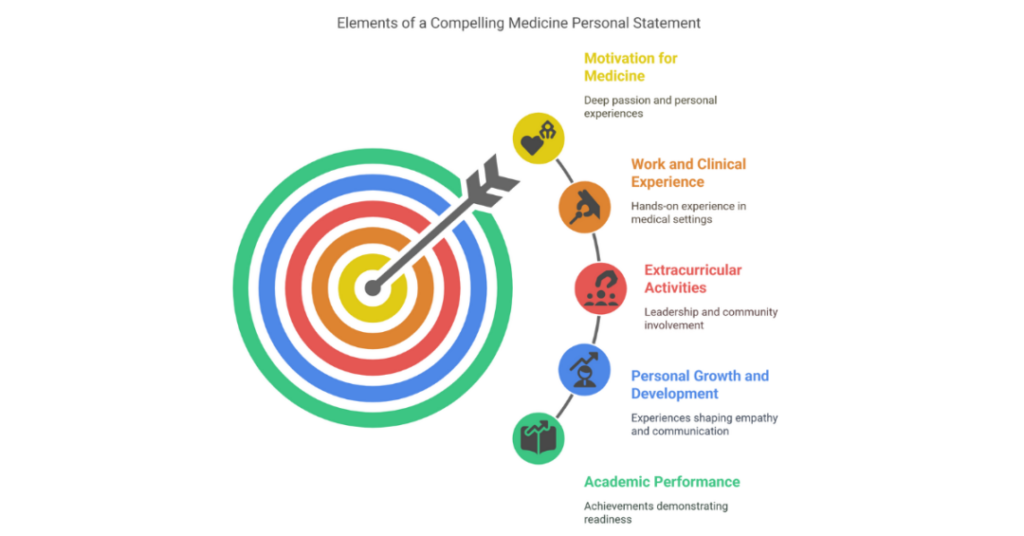6 June 2025
8 minutes read
How to Write a Compelling Medicine Personal Statement for Indian Students?

Key Takeaways
- Medicine personal statement should clearly express your passion for medicine, with specific examples like shadowing or volunteering to demonstrate your commitment to the field.
- Showcase your leadership, communication, and problem-solving skills through experiences like tutoring or volunteering in medical settings.
- Connect your past experiences to your future goals, reflecting your understanding of the medical profession and how they align with your aspirations.
Writing a compelling medicine personal statement is a crucial step for Indian students applying to medical school. Admissions tutors are looking for applicants who not only demonstrate a passion for medicine but also possess the necessary skills like communication, leadership, and time management.
Unfortunately, many struggle to stand out amidst the competition, often writing generic statements that lack depth or personal insight. A successful medicine personal statement highlights your unique experiences, commitment to medicine, and desire to make an impact in healthcare.
Why study Medicine Personal statement?
A strong medicine personal statement for university applications is essential for Indian students aiming for a medical career. It offers the opportunity to showcase your passion for medicine, relevant work experience, volunteer roles, and extracurricular activities. Your statement should reflect personal growth, communication skills, and a commitment to helping others in healthcare settings.

Admissions tutors look for candidates who understand the realities of medicine, possess leadership qualities, and demonstrate a genuine interest in pursuing a medical career. A well-crafted personal statement is key to standing out in 2025 admissions.
Key Elements to Include in Your Personal Statement for Medicine
A medicine personal statement plays a pivotal role in showcasing your motivations and qualifications for pursuing a career in medicine. It helps admissions tutors assess your passion, commitment, and potential for success in medical school.

Here are the key elements to include when crafting a compelling personal statement for medicine:
Motivation for Medicine
Explain your deep-rooted passion for medicine and your desire to become a doctor. Highlight personal experiences that sparked your interest, such as shadowing a medic or volunteering in a care home. This will demonstrate your long-term commitment to the medical field.
Work Experience and Clinical Experience
Include any hands-on experience, whether it’s working in a medical setting, volunteering in hospitals, or shadowing healthcare professionals. These experiences show you understand the demands of a medical career and have gained insight into clinical medicine, emergency medicine, or public health.
Extracurricular Activities and Leadership Skills
Admissions tutors want to see a well-rounded applicant. Discuss your extracurricular involvement, especially in roles that highlight leadership skills, such as being a tutor or leading community outreach programs. This shows your ability to work with diverse groups of people.
Personal Growth and Development
Reflect on your personal development through experiences that have shaped you. Discuss how working in care homes, hospitals, or volunteering with vulnerable groups has influenced your ability to empathize and communicate effectively, essential qualities for a successful career in medicine.
Academic Performance and Suitability for Medical School
Include relevant academic achievements such as strong performance in the IELTS, TOEFL, or GRE exams, and mention your GPA or SAT scores if applicable. Highlighting academic success shows you are prepared to handle the rigorous demands of top medical schools like the University of Oxford, Harvard University, and Stanford University.
By incorporating these key elements into your personal statement, you’ll be able to present a clear and compelling case for your suitability to study medicine and your potential to thrive as a future medical student.
How to Structure a Personal Statement for Medicine Admission?
When applying for medicine, structuring your personal statement effectively is key to standing out in the competitive admissions process. A well-organized personal statement allows admissions tutors to understand your motivations, experiences, and potential as a future medical student.
Here’s how to structure your personal statement for medicine admission:
1. Introduction
Start by capturing your interest in medicine and your desire to pursue a medical career. Briefly explain your motivations, using a personal statement example to demonstrate how your interest developed. For Indian students, it’s crucial to connect this passion to your personal experiences, such as shadowing doctors or volunteering in a hospital, showing a strong foundation for your future in medicine.
2. Why Medicine?
Use this section to elaborate on your fascination with the human body, your desire to make an impact on people’s lives, and your understanding of the realities of a medical career. Reflect on specific moments or experiences, such as your involvement in first aid or your engagement with the medical profession, that deepened your commitment to studying medicine. This will demonstrate your true dedication to the practice of medicine.
3. Work Experience and Clinical Exposure
Admissions tutors want to see hands-on experience. Highlight your work or volunteer experience related to medicine, such as volunteering in a hospital, shadowing a physician, or gaining clinical experience. Explain how these experiences have provided you with insights into the medical profession, helped you develop a wide range of skills, and prepared you for the demands of medical school.
4. Skills and Personal Attributes
This section should highlight key attributes necessary for a medical student and future physician, such as your ability to communicate effectively, leadership skills, and the capacity to work under pressure. Discuss any extracurricular activities, such as volunteering in a care home or tutoring others, where you demonstrated these skills. Showcase how these experiences align with the values needed to succeed in the practice of medicine.
5. Conclusion: Your Commitment to Medicine
Wrap up your statement by reaffirming your commitment to a career in medicine. Express how the medical profession offers you the opportunity to make a difference and explain why you’re ready to take on the challenges of studying medicine. Mention your long-term career goals and reflect on how you want to contribute to public health and healthcare.
By structuring your medicine personal statement around these key elements, you’ll effectively convey your dedication, experiences, and readiness for the challenges of medical school, increasing your chances of a successful application in 2026.
Successful Medical School Personal Statement Example
Writing a compelling medical personal statement is one of the most important steps for aspiring medical students. This personal statement example not only reflect your passion for pursuing a career in medicine but also showcase your unique experiences, skills, and personal attributes that make you a strong candidate.
Medical School Personal Statement Example
Ever since I was young, I have been fascinated by the human body, its complexity, and its resilience. The way the body responds to injury, heals itself, and maintains life is nothing short of miraculous. As I grew older, I became increasingly aware of how crucial medical professionals are in aiding this process. This awareness led me to pursue my passion for medicine, and I am now eager to take the next step in my journey—becoming a physician. Through both personal experiences and academic pursuits, I have come to understand that medicine offers an opportunity to combine my fascination with science and my desire to help others.
My interest in studying medicine solidified during my high school years when I had the opportunity to shadow a family friend who worked as an emergency medic. This firsthand experience in a high-pressure medical setting showed me the immediate and profound impact a physician can have on a person’s life. I observed how the team worked seamlessly together to diagnose and treat patients, providing not just medical care but also emotional support. This experience deepened my interest in pursuing medicine, especially emergency medicine, where swift, decisive actions can save lives.
Throughout my undergraduate years, I took every opportunity to immerse myself in experiences related to healthcare. I volunteered in a local care home, where I assisted elderly residents with their daily activities, learned about their medical needs, and interacted with nurses and doctors who provided care. This experience not only helped me understand the side of medicine that involves long-term care but also taught me essential skills such as empathy, patience, and communication. I was able to practice effective communication by talking with patients from diverse backgrounds, learning to adapt my approach depending on their needs.
Additionally, I worked as a tutor for students struggling with science subjects. This experience allowed me to develop my leadership skills, providing me with the ability to break down complex concepts and explain them in ways that others could understand. This has translated directly into my ability to convey important medical information to patients, ensuring they are well-informed and comfortable with their treatment plans.
Through my engagement with medical professionals, I learned that medicine is about far more than just academic knowledge. It’s about understanding people—whether in a hospital setting or a care home—and helping them live healthier, fuller lives. The ability to make a tangible difference in a patient’s life is what motivates me to pursue this career. I also believe that my personal growth, paired with my ability to work in a team, will allow me to thrive in medical school and beyond.
As I reflect on my journey, I know I am ready to take the next step in my medical career. I have worked on my personal statement extensively, ensuring that I have conveyed not only my qualifications but also my deep commitment to pursuing a career as a doctor. My ultimate goal is to work in public health, helping underserved populations gain access to the care they need. I believe the skills I have developed—both academically and personally—make me a strong candidate for medical school, and I am eager to contribute to the field of medicine.
What Works and Why
- Clear Passion and Motivation: The personal statement effectively conveys the applicant’s motivation for pursuing a career in medicine, starting with a personal interest in the human body and a specific experience that sparked their passion.
- Relevant Experiences: The applicant highlights key personal experiences, including shadowing a medic and volunteering in a care home, demonstrating their commitment to medicine and exposure to diverse aspects of the profession.
- Personal Development: The applicant mentions leadership and communication skills gained through tutoring and volunteer work, showing a well-rounded character with key personal attributes such as empathy and teamwork.
- Understanding of Medicine’s Demands: The personal statement demonstrates the applicant’s clear understanding of the demands of medical school and a career in medicine, showcasing their readiness to take on the challenges.
Improvements You Can Learn From
- More Specific Examples: While the statement includes valuable experiences, it could benefit from more specific examples of clinical settings where the applicant made a direct impact. Including specific cases or outcomes would strengthen the narrative.
- Personal Reflection: The applicant could expand on how each experience specifically influenced their decision to pursue medicine, providing more insight into their personal development throughout the statement.
- Connection to Future Goals: While the personal statement touches on the applicant’s future aspirations, a clearer connection between the experiences mentioned and their long-term medical goals (e.g., public health, specific specialties) would provide a stronger conclusion.
Conclusion
Your medicine personal statement is your opportunity to demonstrate your passion, experiences, and readiness for the challenges of medical school. It’s not just about academic qualifications, but about showcasing the unique qualities that make you a future physician.
If you’re ready to craft a compelling personal statement that stands out, Ambitio is here to help. With our expert profile-building services and personalized guidance, we ensure that your application resonates with top medical schools.
Let us be your partner in turning your dream of becoming a doctor into a reality. Join Ambitio Elite today and shape your future in medicine!
FAQs
What is a medicine personal statement?
A medicine personal statement is a written essay required in medical school applications, showcasing your motivation, experiences, and suitability for a career in medicine.
How long should a medicine personal statement be?
A medicine personal statement should be about 4,000 characters or roughly 500 words, fitting within 47 lines.
What should I include in my medicine personal statement?
Your medicine personal statement should highlight your motivation for medicine, relevant experiences, suitability for the profession, and personal reflection on your journey.
How do I make my medicine personal statement stand out?
Use specific examples, showcase unique qualities, avoid clichés, and reflect on what you learned from your experiences in your medicine personal statement.
Can I mention personal challenges in my medicine personal statement?
Yes, discussing personal challenges is encouraged if you reflect on how they shaped your motivation and growth in your medicine personal statement.
Who should review my medicine personal statement before submission?
Have your medicine personal statement reviewed by mentors, teachers, or professionals for feedback and editing to ensure clarity and professionalism.
What are common mistakes to avoid in a medicine personal statement?
Avoid being generic, listing experiences without reflection, using clichés, or focusing too much on others instead of your own journey in your medicine personal statement.

You can study at top universities worldwide!
Get expert tips and tricks to get into top universities with a free expert session.
Book Your Free 30-Minute Session Now! Book a call now




























